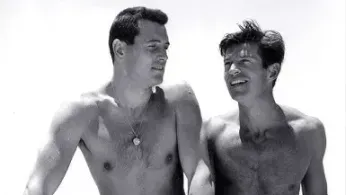
6 hours ago
Armistead Maupin Recounts Friendship and Intimacy With Rock Hudson
READ TIME: 3 MIN.
Armistead Maupin, the author of the influential "Tales of the City" series, has shared new, first‑person detail about his intimate relationship and long friendship with Hollywood star Rock Hudson, describing a bond that moved from desire to companionship against the backdrop of closeted studio culture and the emerging gay liberation movement. Maupin’s recent essay revisits their connection in the 1970s and early 1980s, including moments of intimacy, conversations about coming out, and the strain created by radically different levels of openness about sexuality.
Maupin recounts first meeting Hudson after a stage performance in San Bernardino, when a brief backstage encounter in a darkened hallway led to flirtation and the beginning of a personal relationship. He describes how the two later spent time together in San Francisco, where Hudson was recognized by fans as “Commissioner McMillan,” reflecting his then‑current television role on "McMillan & Wife" . Maupin recalls the intimidation he felt being physically intimate with one of Hollywood’s most famous leading men, a dynamic he says evolved into a more relaxed sexual and emotional connection on subsequent visits to Hudson’s Los Angeles home, known among friends as “The Castle.”
In a separate conversation with Interview Magazine, Maupin has previously spoken with humor and candor about doing poppers with Hudson in the mid‑1970s, noting the contrast between the actor’s carefully maintained public image and his private life among gay friends. These accounts together underscore the dual existence many gay and bisexual men in Hollywood were compelled to lead during a period when same‑sex relationships could end careers.
Maupin’s essay places their relationship within a broader climate of fear and control surrounding queer lives in mid‑century Hollywood. He describes a social environment where gossip magazines such as Confidential targeted suspected gay actors and where some agents allegedly traded information about one client’s private life to shield another from exposure. According to historical reporting, Hudson’s own agent, Henry Willson, was widely rumored to have managed and suppressed stories about clients’ sexuality in order to preserve box‑office bankability in an era when homosexuality was criminalized in many jurisdictions and socially stigmatized across the United States.
Maupin contrasts that atmosphere with queer life in 1970s San Francisco, where he was living openly as a gay man, writing a daily serial that depicted LGBTQ+ characters with unprecedented visibility in a mainstream newspaper. This openness, he notes, was difficult to reconcile with Hudson’s tightly controlled public image and his circle’s fear of outing, a tension that would eventually strain their friendship.
One of the most consequential threads in Maupin’s recollections is his account of discussing a possible coming‑out interview with Hudson at a dinner in San Francisco. Maupin writes that he offered to write the story himself, arguing that a truthful, voluntary disclosure could be powerful, both for Hudson and for other gay people. According to Maupin, Hudson’s partner at the time responded that such a step should not occur “until my mother dies,” highlighting how family concerns and generational attitudes shaped decisions about disclosure even among those closest to the actor.
Biographical reporting indicates that Hudson did at times seriously consider publicly acknowledging his sexuality but ultimately rejected the idea, fearing the professional and personal consequences of doing so during his peak years in film and television. Maupin’s account adds an insider’s perspective to those historical assessments, illuminating how questions of agency, safety, and responsibility were navigated privately by one of cinema’s most famous closeted stars.
Maupin writes that he eventually distanced himself from Hudson as his own literary profile grew and as he became less willing to maintain a secret friendship that did not align with his public activism. When Hudson was later diagnosed with AIDS and his illness became public in 1985, journalist Randy Shilts of the San Francisco Chronicle reportedly asked Maupin for comment, leading Maupin to state that Hudson was a good man and that “everyone in Hollywood knew he was gay.” Maupin recalls receiving backlash for that remark, at a time before the term “outing” had entered common usage to describe publicly naming someone’s sexual orientation without explicit consent.
Hudson’s confirmation that he was living with AIDS, and his death later that year, is widely recognized by historians as a pivotal moment in public awareness of the epidemic, putting a famous face to a crisis that had been largely ignored in mainstream media and government response. Maupin’s renewed reflections connect that turning point to the earlier, quieter debates about visibility, safety, and responsibility that he and Hudson shared in private, offering present‑day LGBTQ+ readers and allies additional context for understanding how one star’s private life and public disclosure helped shift the conversation about AIDS, stigma, and queer existence in the late 20th century.






